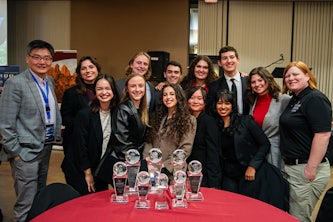McKelvey Engineering students win Rice360 global health tech design competition
The team won first place at the Rice360 Institute for Global Health Technologies’ annual Global Health Technologies Design Competition

Fistula Fighters, a team of three McKelvey School of Engineering students, won first place at the Rice360 Institute for Global Health Technologies’ annual Global Health Technologies Design Competition. Team members Trinh Woolridge, a senior majoring in biomedical engineering, and Savannah Chatman and Samantha Olson, both Dual Degree students in the Department of Biomedical Engineering, competed against 27 teams to take home the $500 top prize.
The competition recognizes designs for low-cost technologies that address global health challenges in resource-limited settings.
The team developed a wearable device for those experiencing urinary incontinence due to vesicovaginal fistulas, which are abnormal openings between the bladder and vagina that result from prolonged and obstructed labor. The device is a biker-style short with a built-in urine collection cup and bag, enabling users to seamlessly perform everyday tasks and avoid the stigma associated with incontinence.
Throughout the project, the group worked with mentors Christine O'Brien, assistant professor of biomedical engineering; Lewis Wall, professor of sociocultural anthropology in Arts & Sciences and of obstetrics & gynecology at the School of Medicine; and Tracy Spitznagle, professor of physical therapy the School of Medicine.
“After meeting with our mentors, all of us felt passionate about the subject area,” Olson said. “We’d never heard about this problem before, but knowing how many women suffer from it, we felt really compelled to try to find a solution other than surgery.”
Chatman said that the design process was the best part of the project.
“Each of us worked on different parts based on our strengths,” Chatman said. “It was so fun to work with the different materials – silicone, sewing the biker shorts, using the 3D printers in the makerspace, and doing a lot of different testing to make sure our design was what we wanted it to be.”
The group developed the project as part of the Biomedical Engineering Senior Capstone Design class and presented to judges during the annual BME Day, where the group again earned first place.
The team plans to continue working with its mentors to further develop and improve the device.
“We are so excited to continue to develop and improve our design for the device,” Woolridge said. “We understand the difference our shorts can make, and we are dedicated to continue innovating and advocating for them.”
Read the award announcement from Rice News here.



